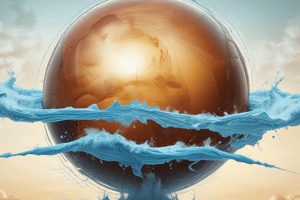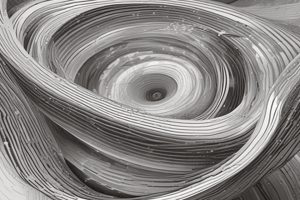Podcast
Questions and Answers
What happens to pressure as you go deeper in a liquid?
What happens to pressure as you go deeper in a liquid?
- It fluctuates
- It decreases
- It increases (correct)
- It stays the same
Why is the water at the bottom of a container under greater pressure?
Why is the water at the bottom of a container under greater pressure?
- Because it has a smaller mass
- Because it is closer to the surface
- Because it has the weight of the water above it (correct)
- Because it is denser
What do dam walls need to be at the bottom?
What do dam walls need to be at the bottom?
- Weaker and thinner
- Stronger and thicker (correct)
- Stronger and thinner
- Weaker and thicker
What happens to the pressure of the water above a diver as they descend?
What happens to the pressure of the water above a diver as they descend?
Why do submarines need thick and strong hulls?
Why do submarines need thick and strong hulls?
At which point is the water pressure greatest in the diagram?
At which point is the water pressure greatest in the diagram?
What is the main reason for the increased pressure at the bottom of a container?
What is the main reason for the increased pressure at the bottom of a container?
What happens to the force exerted on a diver as they descend?
What happens to the force exerted on a diver as they descend?
Why do dam walls need to be thicker at the bottom?
Why do dam walls need to be thicker at the bottom?
What is the relationship between pressure and depth in a liquid?
What is the relationship between pressure and depth in a liquid?
Flashcards are hidden until you start studying
Study Notes
Pressure in Liquids
- Liquid pressure is the pressure produced by the collisions of particles in a liquid.
- The pressure in liquids acts in all directions.
Factors Affecting Liquid Pressure
- Liquid pressure increases with depth.
- The extra weight of water above provides an increased force and hence an increased water pressure as depth increases.
Characteristics of Liquids
- Liquids are incompressible, meaning they cannot be compressed.
- Liquids can flow, making them fluids.
- Particles in liquids are close together and able to move over each other, allowing them to flow.
Calculating Pressure in Liquids
- The formula to calculate pressure in liquids is: Pressure = hρg, where h is the height of the liquid, ρ is the density of the liquid, and g is the acceleration due to gravity (9.8 N/kg).
Real-Life Applications
- Dam walls need to be stronger at the bottom due to increased pressure with depth.
- Divers need to be careful when descending into the water as the pressure of the water above them increases, exerting a greater force on their body.
- Submarines need thick and strong reinforced hulls to tolerate the higher pressures at greater depths.
Key Concepts
- Pressure: the force caused by particles hitting a container.
- Flow: the ability of a substance to move freely.
- Compressed: unable to be squashed.
- Directions: liquid pressure acts in all directions.
Studying That Suits You
Use AI to generate personalized quizzes and flashcards to suit your learning preferences.




